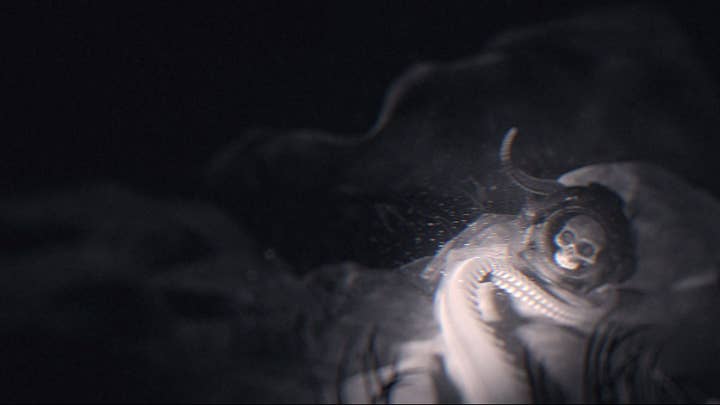Nightdive Studios: "If we want to say games is an art form, then we have to respect our past"
The remaster specialists behind Quake, Shadowman and Turok discuss their approach to keeping the classics alive
"We just want to make the kinds of games we'd like to play."
Work in the games media long enough, and interview enough studio directors, and you will have encountered that phrase. It's a simple notion: We're not interested in the trends, we just want to make the things we like.
Yet I've never encountered a studio where that sentence is so undeniably true as Nightdive, the team behind popular remasters such as Quake, Shadowman and Turok. It was a company born out of a developer who wanted to play a game but couldn't.
"My background is in character art," begins Nightdive CEO Stephen Kick.
"I was working at Sony Online Entertainment for a number of years, along with my girlfriend at the time, and I got burned out creatively. So we quit our jobs, packed up everything into this little Honda Civic and we drove across the border into Mexico, with the intent that we would travel for as long as we could afford to.
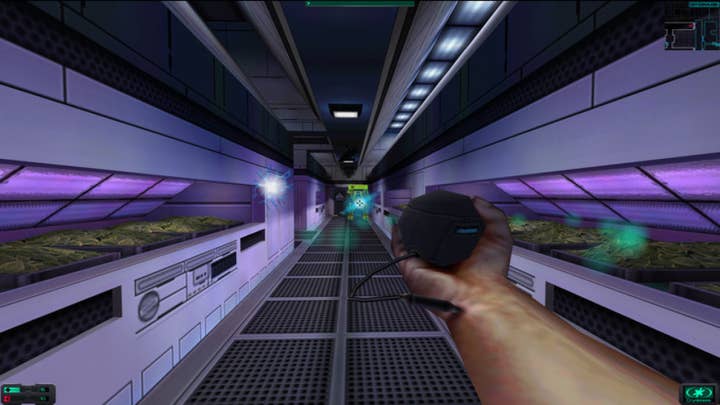
"I brought a little netbook with me, and I put a whole bunch of classic games on there. Six or seven months in the trip when we were in Guatemala, I had this urge to play System Shock 2. I went to go boot it all up... and I just couldn't get it to run. I went to [retro games digital retailer] GOG.com, and they didn't have it, but it was one of their top requested games of all time.
"That led me in this rabbit hole of trying to find out what happened to [original developer] Looking Glass. Where did the rights go? At the end of the night I had an email address for the general counsel of an insurance company in the Midwest, who wrote back to me almost immediately."
The licence holder was interested in Kick developing a System Shock 3, but that was out of the question.
"If you bring in somebody who's a Call of Duty fan and you tell them to remake Quake, you're going to get Quake that looks like Call of Duty"
Larry Kuperman, Nightdive
"I was in the middle of the jungle and probably had about $5,000 to my name. So I proposed that we re-released the original games digitally. They hadn't had that proposal yet, so they took the risk and that's how Nightdive got started."
Nightdive is currently 40 people based around the world and split across two development teams. Its first employee, outside of Stephen and his partner, was UK-based Daniel Grayshon, who had been posting System Shock mod guides online.
"Basically that's how I found everybody who works for Nightdive, more or less," Kick says. "They're doing something really cool that has some kind of connection to a classic IP, and they just end up turning their passion into a career."
Business development director Larry Kuperman adds: "We hire people who know and love this stuff. If you bring in somebody who's a Call of Duty fan and you tell them to remake Quake, well, you're going to get Quake that looks like Call of Duty. If you hire somebody that loves Quake, you're going to get something that looks like the original Quake."
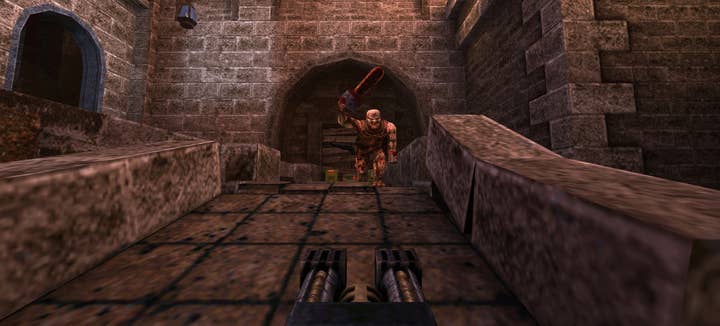
It was one such classic game fan who developed Nightdive's secret weapon: the KEX engine.
"Well, not so secret, we include the logo in all the game, but yes, that that has been our competitive advantage," Kuperman tells us. "It was designed by our lead engine developer who's still with us, Sam 'Kaiser' Villareal."
Kick explains: "We had been looking at doing Turok, and in our research we discovered that Sam was working on a reverse engineered port of the N64 game. This was the big turning point for Nightdive, where we went from just doing emulated re-releases, using DOSbox or ScummVM, to what we did with Turok where we had a custom engine. That was really kind of our gateway to where we are now. We don't just put the games back out as they were, we enhance them, we include all kinds of modern features to make them smoother, more enjoyable. We like to make the games as you remember them, rather than exactly as they were."
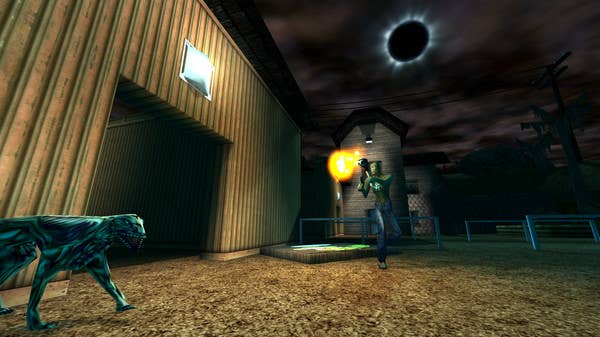
It's not just about making these games run at 4K and 60fps, either. In last month's release of Shadowman, the firm added in entirely new levels, bosses and areas that had initially been cut from the game due to time, under the guidance of original Shadowman composer Tim Haywood.
"He was there pretty much every step of the way," Kick says. "Whenever we had a question about the new content that we implemented, he was there to basically say 'this isn't exactly how I remember it, it was more like this' or 'this was ultimately the goal of this level that got cut.' A lot of the time we didn't have the original design documents, and so we had to make up how it should be. Fortunately Tim was there, to hold our hand."
Kuperman adds: "One of the key factors in our decision making around what games to bring back is access to the source code. Very often we find things in the source code that got cut from the original just because they ran out of time, or that that they felt would make the game too big, and we're able to restore some of those."
Changing things can be controversial amongst the classic game community. There's always a fine balancing act between staying true to the original, and modernising it for today's audience.
Fans also can want different things, and the key for Nightdive has been catering to as many of them as possible. For instance, in the original Turok, the developers used 'fog' to hide asset pop-up, but with modern technology that's not an issue. Nightdive's remaster allows players to see much further into the distance, yet to preserve that original style, fans can turn the fog back on.
"There was a very in-depth discussion about adding a map to Shadowman," Kick says. "But it kind of took away the mystery and the labyrinthian quality of levels. But in Turok 2, for example, just being able to find out where to go next was kind of a negative aspect of the game and so our guys put in waypoints... but those can be turned off if you want the original experience. We never force anything on a player, it's always an option that you can toggle off."
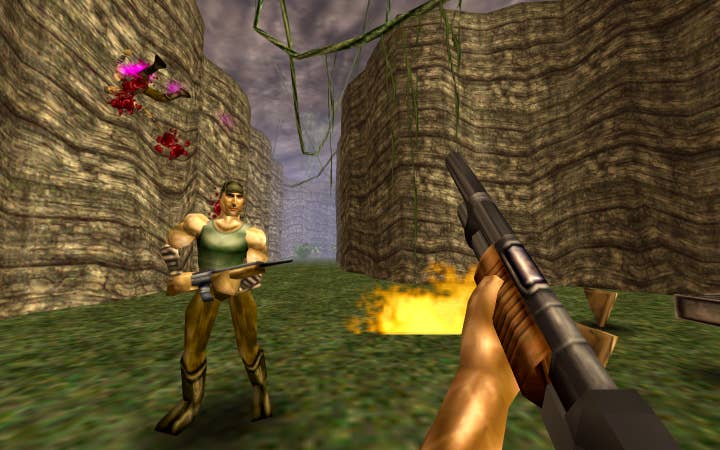
Shadowman is a pretty niche title, albeit one with a cult audience. The same is true of the studio's latest game, PowerSlave: Exhumed. Yet it's starting to work on bigger brands, namely Quake and Doom. Should we therefore expect Nightdive to move away from the unusual projects to focus on the bigger brands?
"Not as long as Stephen is my boss," Kuperman says laughing. "We're going to continue paying attention to some of the obscure or lesser-known games. Our goal is -- hence the reason we're called Nightdive -- to bring back the lost treasures and release games that you didn't know you wanted to play."
Kick adds, "That's always been a guiding philosophy. If we want to say that games is an art form and what we create collectively is art, then we have to respect our past. We have to make it playable and enjoyable and we have to make sure that people can experience it."
He continues: "There are games they didn't really move the needle in terms of sales, but since the re-release they've discovered a completely new audience that has come to really appreciate them. Hopefully by being able to play these games they will influence the next generation of developers so that our unconscious collective is not just Call of Duty or PUBG."
Nightdive's journey has gone from ports to remasters to director's cuts, and the next logical step is the full remake. The studio's current big project is exactly that: a remake of the original System Shock. The project has undergone numerous changes down the years, but it's now finally progressing well and due out this year.
"The remake aspect is something that is entirely new for us, and the team that we've built up around that kind of exemplifies our desire to take something from 1994 and make it definitely more accessible to modern gamers," Kick says.
"It's always been a goal to develop an original IP, but if we ever do that it'll probably be a spiritual successor"
Stephen Kick, Nightdive
"We've got one of the original developers on the team to help us when it comes to tough decisions. That's been a real boon for us, to have a guiding light to ensure that the DNA of what made System Shock System Shock is still present. It's going to surprise a lot of people that you can create a game with some of those antiquated design philosophies and it still works well today.
"There is just a lot of little things that people are going to re-discover about classic games in general when they play this, because we are kind of going at it with the idea that some modern games, shooters especially, maybe are a little too easy. They hold your hand a little too much and they aren't demanding as much from the players as the classics did, and I'm hoping that that's a refreshing thing for a lot of people."
Kuperman add: "In our ups and downs, we found we didn't want to make a completely different game, and that really cost us a lot in terms of time and money. There is a tremendous temptation when you start working on a classic to put your own imprint on it, and that's fine if you stay within the original design, or as long as we respect what was originally part of it. When you lose sight of that, that's why we had to refocus."
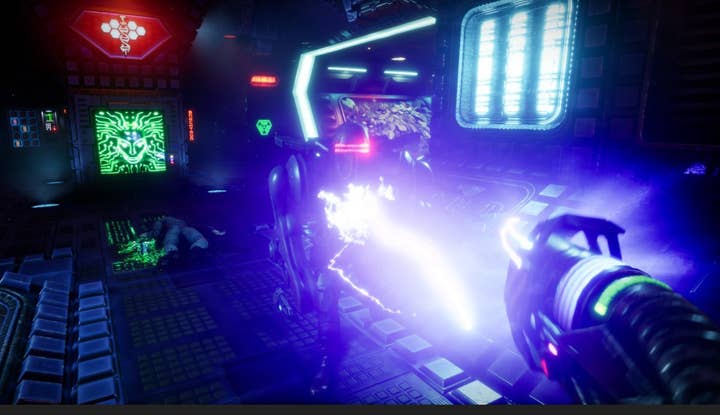
Now with ports, remasters and remakes... the next step would be to do something original. Kick says the firm would be interested in doing that, but it will need to fit with what the company is all about.
"It's always been a goal to develop an original IP, but if we ever do that it'll probably be a spiritual successor. There's a lot of great games out there that we haven't been able to get hold of for one reason or another, and the only other route to honour that is to do a spiritual successor."
There is undeniably a skill to a good remaster or remake. For every Crash Bandicoot Trilogy or Resident Evil 2 success, there's a Grand Theft Auto Trilogy Definitive Collection or Warcraft 3 Reforged to remind us how things can go wrong. Nightdive says the secret is making sure you have the right people who truly understand what it is that made the game special in the first place.
"We all grew up playing these games, and we have a really great understanding of what made them fun, and what was annoying about it," Kick says. "We just look at it and go: how far can we take it without violating its spirit? But at the same time make it accessible so that maybe somebody who's never played it before is going to enjoy it as well."
Indeed, Kuperman says that although older games make up the bulk of Nightdive's audience, the studio has found younger gamers are increasingly interested in these classics, too. Plus gamers from outside of Europe and the US.
Despite partnerships with Bethesda, a major remake project, and the desire to keep unearthing forgotten gems, Nightdive isn't about to embark on a huge recruitment drive.
"It's about steady growth," concludes Kuperman. "I'm very concerned about maintaining the Nightdive culture. I don't want to get us to a point where we have to double in size because of a new project that comes up... because you lose something there. But we will keep reinvesting, as we always have done."
